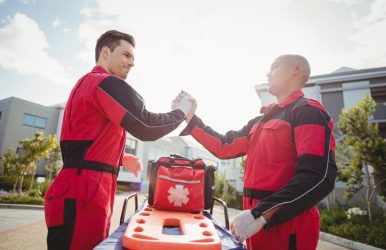How To Deal With A Medical Emergency Abroad
BY Ankita TripathyNov 10, 2023
Traveling is an enriching experience, allowing you to explore new cultures, and landscapes, and create lasting memories. However, alongside the excitement of international adventures, there is also the possibility of facing a medical emergency abroad. While no one wants to think about such situations, being prepared and knowing how to respond can make a crucial difference. Here Are 15 Prime Steps To Deal With A Medical Emergency Abroad In this article, we'll explore essential steps to deal with a medical emergency while traveling abroad, ensuring your safety and well-being. 1. Purchase Travel Insurance Before embarking on your journey, make sure to purchase comprehensive travel insurance that covers medical emergencies. This should include coverage for hospitalization, doctor visits, and medical evacuations, if necessary. Verify the coverage limits and details in your policy to ensure you are adequately protected. Keep a copy of your insurance policy and contact information with you at all times during your trip. 2. Research Local Healthcare Options Before traveling to your destination, research the local healthcare system. Learn about the nearest hospitals, clinics, and pharmacies. Some countries may have advanced medical facilities, while others may have limited access to healthcare. Knowing where to find medical assistance can be crucial in a time of crisis. 3. Carry a First-Aid Kit Pack a compact first-aid kit that includes essentials like bandages, antiseptics, pain relievers, and any prescription medications you need. In case of minor injuries, a well-stocked first-aid kit can provide immediate relief. Familiarize yourself with the contents and their uses before your trip. 4. Learn Basic Phrases If you're traveling to a foreign country where you don't speak the local language, learning basic medical phrases can be immensely helpful. Phrases like "I need a doctor," "I have an allergy to [specific allergen]," or "I need help" can bridge the language barrier in a medical emergency. Carry a small phrasebook or use the translation apps on your phone. 5. Register with Your Embassy Many countries offer registration services for their citizens traveling abroad. Registering with your embassy or consulate allows them to contact you in case of emergencies and provide assistance when needed. It's a simple but crucial step that can make a significant difference in a medical crisis. 6. Create an Emergency Medical Information Card Prepare an emergency medical information card that includes your name, blood type, allergies, existing medical conditions, and emergency contacts. Keep a copy in your wallet, luggage, and smartphone. This card can be instrumental in providing essential medical information to healthcare providers. 7. Emergency Contact List Compile a list of emergency contacts, including family members, close friends, and your primary care physician back home. Share this list with a trusted companion or keep it in a secure place. In the event of a medical emergency, these contacts can provide guidance and support. 8. Know Your Allergies and Medications If you have allergies or are taking prescription medications, it's vital to know the names, dosages, and usage instructions. In the event of a medical emergency, accurate information about your medications and allergies is crucial for healthcare providers to deliver appropriate treatment. 9. Contact Your Insurance Provider In the event of a medical emergency, contact your travel insurance provider immediately. They can guide you on the best course of action, whether it's seeking medical care locally or arranging for medical evacuation if necessary. Ensure you have your insurance policy number and contact information readily available. 10. Seek Immediate Medical Care If you or someone you're traveling with experiences a medical emergency, the most critical step is to seek immediate medical care. Do not delay in the hope that the situation will improve on its own. Call local emergency services or go to the nearest hospital or clinic. Timely medical attention can prevent a minor issue from escalating into a major crisis. 11. Communicate with Loved Ones Once you've secured medical care, it's essential to communicate with your loved ones back home. This will keep them informed about your situation and alleviate their concerns. Regular updates can also help in coordinating support and decision-making if necessary. 12. Maintain a Copy of Medical Records Request a copy of your medical records, including test results and treatment notes, from the healthcare facility. Having these records can be invaluable if you require further treatment or follow-up care upon returning home. 13. Keep Your Travel Companion Informed If you're traveling with someone, make sure they are aware of your medical history, allergies, and any specific health concerns. In the event of a medical emergency, they can assist in communicating your needs to healthcare providers. 14. Preventative Measures While it's impossible to predict and prevent all medical emergencies, taking precautions can minimize risks. Practice good hygiene, follow local health advisories, and consider vaccinations or prophylactic medications recommended for your travel destination. The West Palm beach personal injury attorneys at GOLDLAW encourage travelers to be prepared for all types of potential emergencies while abroad. 15. Stay Calm and Informed During a medical emergency, staying calm and informed is essential. Panic can exacerbate the situation and impede clear decision-making. Follow the advice of healthcare providers and trust in their expertise. Facing a medical emergency while traveling abroad is a daunting prospect, but being well-prepared can mitigate the risks and ensure a swift and effective response. Remember, being informed and prepared is the key to addressing any unforeseen challenges that may arise while exploring the world. Read Also: How To Fund The Cost Of Travelling 5 Tips To Protect Your Passport While Travelling Abroad Vacationing Without Travel Insurance? Here’s What Might Happen If You Need It!










 Latest
Latest




